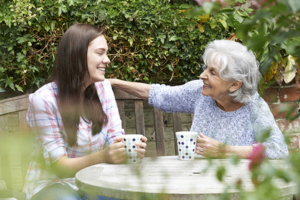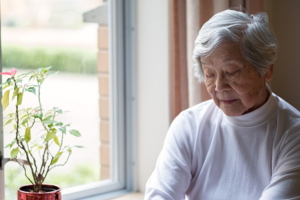Increasing Social Engagement for Introverted Seniors

Learn how to increase social engagement for introverted seniors.
Brace yourself! The holidays are here. Many people may love the frantic pace of parties and celebrations, but there are others who balk at the thought of stepping out of their comfort zone and into more intensive social obligations. It could be due to one of two fundamental distinctions: extroversion vs. introversion. And it’s worthwhile to know which category the older adults in your life lean towards more, so you can help them thrive with the most appropriate type of socialization for their personality.
What’s the Difference Between Introverts and Extroverts?
In all reality, no one is exclusively one or the other. Think of a continuum with introversion on one end and extroversion on the other. We are all sitting at some point along that continuum. The main traits of introversion include a more reserved, quiet, and internally-focused viewpoint, while extroversion involves a more outward focus: sociable, talkative, and action-oriented.
It’s intriguing to know that psychologists believe we grow more introverted as we age, in a condition referred to as “intrinsic maturation.” So just because a senior you love once fully enjoyed and drew energy from highly social settings, you may see a change towards beginning to feel more self-contained and satisfied with small, intimate social scenes or even just spending more time alone.
Knowing that social engagement for introverted seniors is crucial to a senior’s health and wellness, how can you help a more introverted individual enjoy time together with family and friends, not only during the holidays, but all year long? These guidelines can help.
- Assign a buddy. Having one trusted, close friend, family member, or caregiver to stay close to the senior adds an amount of familiarity and comfort to what may seem like an intimidating setting.
- Agree on a specific exit time. Talk with the senior about how much time might feel comfortable for socializing. If they would like to stay for just an hour, for example, be sure to respect that decision and be prepared to leave when they are.
- Stay near the perimeter. Instead of motivating the older adult to be front and center in a social environment, choose a quieter place at the edge of the group, where they can talk with one or two people at a time.
How Can Home Care Help Increase Social Engagement for Introverted Seniors?
A caregiver from Responsive Home Care offers the ideal opportunity for the one-on-one social engagement for introverted seniors. Just a few of the numerous ways we can help include:
- Going to holiday gatherings with the senior to ensure all of their needs are met in the most comfortable setting
- Providing accompanied transportation to a small-group class or to learn a new hobby they’ve always wanted to try
- Providing companionship at home for discussions and activities that are fun for the senior
- And much more
Contact Responsive Home Care, offering the most trusted home health care service in Fort Lauderdale, FL and the surrounding areas, online or at (954) 486-6440. You can receive more recommendations to help a senior you love enjoy the greatest possible quality of life, and to learn how a professional caregiver can help.



 We know that socialization is vitally important for our overall emotional (and even physical) wellbeing – but we also know that senior loneliness is an epidemic in America. With the hectic pace of life, it’s difficult for families and friends to provide the full measure of social interaction needed to keep isolation at bay for older adults, who are often homebound or unable to get out as much as they’d like.
We know that socialization is vitally important for our overall emotional (and even physical) wellbeing – but we also know that senior loneliness is an epidemic in America. With the hectic pace of life, it’s difficult for families and friends to provide the full measure of social interaction needed to keep isolation at bay for older adults, who are often homebound or unable to get out as much as they’d like.